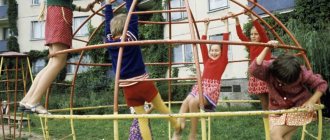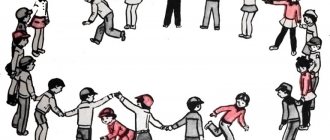“Outdoor games, their types. Importance for personality development"
“Outdoor games, their types. Importance for personality development"
Outdoor game
– this is a child’s conscious motor activity, characterized by the accurate and timely completion of tasks related to the rules that are mandatory for all players. The exciting content and emotional richness of the game encourage the child to make certain mental and physical efforts.
The specificity of outdoor play is the child’s lightning-fast, instant response to the signals “Catch!”, “Run!” "Stop!" and others.
Outdoor game
– an indispensable means of replenishing a child’s knowledge and ideas about the world around him, developing thinking, ingenuity, dexterity, dexterity, and valuable moral and volitional qualities.
Target:
The main goal of outdoor games is to develop physical qualities in a child: speed, endurance, dexterity, strength.
Tasks of outdoor games
- Expanding motor experience and enriching it with new, more complex movements;
- Improving motor skills and their use in changing game situations;
- Development of creative abilities and physical qualities;
- Fostering independence and activity with new, more complex movements;
- Introducing basic norms and rules of relationships with peers and adults
For the success of the game it is necessary to take into account
- The complexity of movements and the appropriateness of their combination, taking into account the readiness of children.
- Compliance of the content of games and exercises with the weather and time of year.
- Using different techniques for selecting children for leading roles.
- Variability of outdoor games with the aim of developing creativity and positive motivation for self-expression in movement.
TYPES OF OUTDOOR GAMES
ELEMENTARY GAMES
| Story games They have a ready-made plot and firmly fixed rules; game actions are related to the development of the plot and the role played by the child. These games are mainly collective. The plot ones include: folk round dance games (with singing and recitative): “Boyars”, “Pebble”, “Golden Gate”, “Goat”, “And we sowed millet”, “Stream” and folk games without singing: “Cat and Mice”, “ Ring”, etc. |
| Plotless games contain motor game tasks that are interesting for children, leading to achieving the game goal. These include:
|
CHALLENGING GAMES
| These include sports games: small towns, badminton, table tennis, basketball, volleyball, football, which require composure, organization, observation, development of movement techniques, and speed of reaction. Depending on the age of the children, they can play according to simplified rules (including in groups of different ages). |
Outdoor games vary:
- according to the complexity of movements;
- according to the content of the plot;
- by the number of rules and roles;
- by the nature of the relationship between the players;
- by the presence of competitive elements and verbal accompaniment.
Outdoor games also differ in motor content:
- running games,
- jumping,
- throwing, etc.
According to the degree of physical activity:
- high mobility games,
- medium and small.
The importance of outdoor games for personality development
A normally developing child strives for movement from birth. Children usually strive to satisfy their enormous need for movement in games, since play is the leading activity of preschoolers. For them, playing means, first of all, moving and acting. Outdoor play is one of the important means of comprehensive education of preschool children.
Its characteristic feature is the complexity of the impact on the body and on all aspects of the child’s personality in the game, which is simultaneously carried out:
|
| Active motor activity of a playful nature and the positive emotions it evokes enhance everything physiological processes in organism:
|
With the help of outdoor games, comprehensive physical development
child.
| The role of outdoor play is great in mental development child:
|
| During the game they become active memory, representation, thinking develops, imagination. |
| Children learn the meaning of the game, remember the rules learn to act in accordance with their chosen role, creatively use existing motor skills, learn to analyze their actions and the actions of their comrades. |
Outdoor games are often accompanied by songs, poems, counting rhymes, and game starters. Such games replenish vocabulary and enrich children's speech.
Outdoor games are also of great importance for moral education.
Children:
|
Outdoor play teaches sincerity and camaraderie. By obeying the rules of the game, children practically practice moral actions, learn to be friends, empathize, and help each other.
Skillful, thoughtful management of the game by the teacher contributes to the development of an active creative personality.
In outdoor games, the aesthetic perception of the world is improved.
Children learn the beauty of movements, their imagery, and they develop a sense of rhythm. They master poetic figurative speech.
Outdoor play prepares a child to work:
|
Only with systematic repetition of outdoor games are the acquired methods of action consolidated and improved. Children develop good orientation in a play situation. Children quickly lose interest in games that are repeated without changes: it is necessary to modify the content and complicate motor tasks.
As the game progresses, impromptu remarks on the part of the teacher are possible. Such moments can be caused by the emotional state of children, the desire to express themselves in movement. Impromptu provides an opportunity to develop children’s own creative abilities. So, while playing, a child is not only able to reproduce the movement shown by an adult, but is also able, with the content of the game, to give the actions imaginary properties that exist in his memory in the form of ideas and concepts.
The game “grows” with the child throughout his childhood.
Thus, outdoor play is an indispensable means of replenishing a child’s knowledge and ideas about the world around him, developing thinking, ingenuity, dexterity, dexterity, and valuable moral and volitional qualities. When conducting outdoor play, there are unlimited possibilities for the integrated use of various methods aimed at shaping the child’s personality. During the game, not only the exercise of existing skills occurs, their consolidation and improvement, but also the formation of new mental processes, new personality traits of the child.
The game is accompanied from birth, remains with him in childhood, adolescence, right up to the transition to adolescence. The game reflects the world of children's thoughts and feelings and leads them along the path of understanding reality.
Middle and high school students
Older students will be interested in different games than primary school students. From a pedagogical point of view, it is more difficult to captivate a teenager than younger children.
This task will be easier to cope with if new games are introduced that keep up with the times. Games in nature are especially useful for schoolchildren, because ordinary walks will not provide the necessary physical activity.
Lincoln's snowball blunder
High school students will also want to play an exciting game with a popular plot. Winter fun will captivate every child.
Features: carried out in winter, when there is enough fresh snow and not severe frost, there is sufficient space outside.
Details: a plastic bottle with colored rice (rice is painted with food coloring) will imitate a bottle of holy water; a picture depicting a city map, red and blue ribbons for each participant.
What else to read: Games with children at home: ideas for a great time
Story for the plot: President Lincoln fights werewolves. The werewolves are sitting in the fortress, the president and his assistants are in the apartment. They decide to go fight evil. The object of the struggle is a map of the city, which the werewolves keep in their fortress.
Organization of the game:
- The day before you need to make 2 fortresses at a distance of 9-10 m from each other, the height of a child.
- Teams of werewolves, Lincoln and his assistants are selected.
- Each participant marks himself with a ribbon: the werewolves are red, the wrestling team is blue.
- The werewolves take a position in their fortress, and the map is located in this fortress. Werewolf weapons: snowballs.
- The President and his team occupy the second fortress-apartment. Their weapons: a bottle of holy water (dyed rice) and snowballs.
- Lincoln jumps up so that the werewolves can see it and waves his hand, saying: “I won’t give you an easy life, but I’ll show you an example. The only way for you to save yourself is to give the card to us!”
- After this, the werewolf hunters try to run to their opponents' fortress and take the map. Werewolves are trying to break into the president's apartment.
- If a snowball hits a member of one of the teams, he is eliminated from the game for three minutes. When holy water hits a werewolf, he is knocked out for 10 minutes.
- The game ends when the president's team has captured the map, or if a third of the werewolves have entered the apartment.
Relay race
Relay races are known in every school; they are held in physical education classes. Conducting relay races improves physical fitness and strengthens the competitive spirit. General principle:
- Invite children to divide into teams.
- Form teams into columns at the starting line.
- On the command “March!” the captain runs (jumps) to the flag, touches it with his hand and returns to the team.
- Pats the next person in the column on the shoulder, who performs the same actions as the captain, and so on.
- The winner is the team whose last link returns to the starting line first.
Other games
High school students do athletics and run short distances. But still, they will play football with great pleasure. The purpose of outdoor play is not only to improve physical characteristics, but also to instill a lifelong love of sports.






